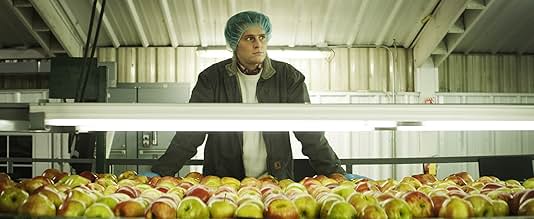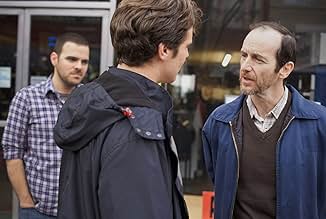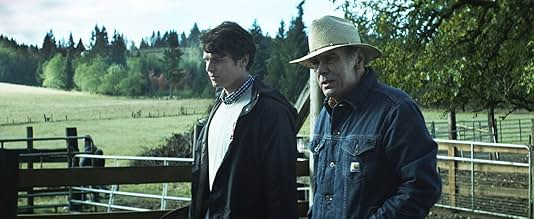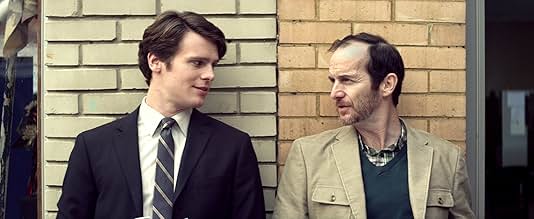A cocky young man travels to Oregon to work on an apple farm. Out of his element, he finds his lifestyle and notions being picked apart by everyone who crosses his path.A cocky young man travels to Oregon to work on an apple farm. Out of his element, he finds his lifestyle and notions being picked apart by everyone who crosses his path.A cocky young man travels to Oregon to work on an apple farm. Out of his element, he finds his lifestyle and notions being picked apart by everyone who crosses his path.
- Director
- Writers
- Stars
- Awards
- 1 win & 2 nominations total
Zach Sanchez-Vitale
- Military Guy
- (as Zach Sanchez)
Blake Lindsley
- David's Mom
- (voice)
Eloy Méndez
- Pedro
- (as Eloy Mendez)
Cami Storm
- Pretty Mexican Girl
- (as Cami Marie)
- Director
- Writers
- All cast & crew
- Production, box office & more at IMDbPro
Featured reviews
The movie seems very promising in trailers and even when one starts watching it, almost until the end... when loose ends are left hanging and all of one's hopes for the movie's potential to communicate relevant and illuminating ideas collapse.
Moreover, their referring to many problematic notions and expressions remains unchecked. The use of "retard," "faggot" and "slut" is never explained or condemned. The idea of homosexuality as a sickness--is left unchecked, too; and so are the presentations of immigrant workers as thieves and of menial workers as stupid and not at the level of a college graduate. We are never told or shown how we are supposed to feel about any of these issues. And while the ambiguity of religion is largely okay in a world of various religious convictions (or lack thereof), I don't see how the rest of the topics can responsibly be treated as a matter of contention.
Yet, I loved Jonathan Groff's acting. I also loved the post-graduate attitude, which signified the place from which the emotional journey of the character began. I can really relate to it, too: the way your own struggles and successes make you feel superior to others. Which is why I was hoping David would learn to appreciate people and see them as his equals--which he partly, arguably, maybe did. But then, what was the point of religion? Why the ambiguity surrounding his sexuality? Did he have a problem with his sexual orientation?
I am just confused by the way the movie ended.
Although Jonathan Groff was brilliant, and C.O.G. was mostly well-written and filmed, I felt that it was cut short. Only 10 concluding minutes could clear a lot of my concerns, if included. But, as it stands, the movie is aesthetically, narratively, philosophically and socio-politically unresolved.
Moreover, their referring to many problematic notions and expressions remains unchecked. The use of "retard," "faggot" and "slut" is never explained or condemned. The idea of homosexuality as a sickness--is left unchecked, too; and so are the presentations of immigrant workers as thieves and of menial workers as stupid and not at the level of a college graduate. We are never told or shown how we are supposed to feel about any of these issues. And while the ambiguity of religion is largely okay in a world of various religious convictions (or lack thereof), I don't see how the rest of the topics can responsibly be treated as a matter of contention.
Yet, I loved Jonathan Groff's acting. I also loved the post-graduate attitude, which signified the place from which the emotional journey of the character began. I can really relate to it, too: the way your own struggles and successes make you feel superior to others. Which is why I was hoping David would learn to appreciate people and see them as his equals--which he partly, arguably, maybe did. But then, what was the point of religion? Why the ambiguity surrounding his sexuality? Did he have a problem with his sexual orientation?
I am just confused by the way the movie ended.
Although Jonathan Groff was brilliant, and C.O.G. was mostly well-written and filmed, I felt that it was cut short. Only 10 concluding minutes could clear a lot of my concerns, if included. But, as it stands, the movie is aesthetically, narratively, philosophically and socio-politically unresolved.
For those who admire the writings of David Sedaris (essays and short stories - Barrel Fever, Naked (1997), Holidays on Ice (1997), Me Talk Pretty One Day (2000), Dress Your Family in Corduroy and Denim (2004), and When You Are Engulfed in Flames (2008, Squirrel Seeks Chipmunk: A Modest Bestiary, and Let's Explore Diabetes with Owls (2013) and thus know that much of Sedaris's humor is autobiographical and self-deprecating, and often concerns his family life, his middle-class upbringing in the suburbs of Raleigh, North Carolina, Greek heritage, being out as a gay man, jobs, education, drug use, obsessive behaviors and his life in France, London, and the English South Downs) will be pleased to see his humor translated to the screen by writer/director Kyle Patrick Alvarez. The other aspect of this at times controversial film that makes it important is the choice of casting Jonathan Groff, the gay actor who begins the television series 'Looking' this spring. The choices make the film even more enjoyable because the emphasis is not on the gay aspect but instead on the trials of coming of age and struggling with all the bulwarks society places in our way.
David (meant to be David Sedaris) is a cocky young man who graduates from Yale, yet to escape his dysfunctional family and see the world as it really is, travels to Oregon to work on an apple farm run by Hobbs (Dean Stockwell). Struggling as a non-Hispanic worker he is befriended by a driver named Curly (Corey Stoll) who picks up on David's sexual ambiguity and attempts to seal his fate. David escapes, falls under the wing Jon (Denis O'Hare), a evangelistic Christian who has a history of alcohol addition and anger management all of which he hides under the cloak of being a C.O.G. (Child of God). David joins Jon in making jade clocks in the shape of Oregon to sell at the fair. He 'sees the light' and decides to become a C.O.G. and from there the story plays out in very strange ways. Out of his element, he finds his lifestyle and notions being picked apart by everyone who crosses his path. And his final coming out realization is gently subtle.
The cast is uniformly excellent, but the major kudos go to Jonathan Groff who demonstrates his fine acting skills and magnetic screen presence. The film is after all just a story about a boy of our times. It resonates well.
Grady Harp
David (meant to be David Sedaris) is a cocky young man who graduates from Yale, yet to escape his dysfunctional family and see the world as it really is, travels to Oregon to work on an apple farm run by Hobbs (Dean Stockwell). Struggling as a non-Hispanic worker he is befriended by a driver named Curly (Corey Stoll) who picks up on David's sexual ambiguity and attempts to seal his fate. David escapes, falls under the wing Jon (Denis O'Hare), a evangelistic Christian who has a history of alcohol addition and anger management all of which he hides under the cloak of being a C.O.G. (Child of God). David joins Jon in making jade clocks in the shape of Oregon to sell at the fair. He 'sees the light' and decides to become a C.O.G. and from there the story plays out in very strange ways. Out of his element, he finds his lifestyle and notions being picked apart by everyone who crosses his path. And his final coming out realization is gently subtle.
The cast is uniformly excellent, but the major kudos go to Jonathan Groff who demonstrates his fine acting skills and magnetic screen presence. The film is after all just a story about a boy of our times. It resonates well.
Grady Harp
As a David Sedaris fan, I went to see this movie kinda fearful that it would not do his essay justice. This movie far surpassed my expectations and made me laugh aloud (as reading any Sedaris piece does). This adaptation of C.O.G. was faithful to the spirit of the Sedaris essay, retaining and even adding to its understated, snarky sense of humor.
Jonathan Groff stars as David, capturing a naïve and irreverent guy fresh out of college perfectly. The film opens with a montage of him rubbing shoulders with a bunch of weirdos on a greyhound until he reaches his destination: Oregon. David plans to work on an apple farm in order to experience what "real people" do. Of course, things don't go as planned and unexpected hilarity ensues.
C.O.G. is one of the best new films that I've seen this year. The style and the soundtrack evoke an eccentric yet slightly bleak mood that I really enjoyed. I find that I relate quite heavily to the post-college feelings of uncertainty and aimlessness that David has in the film as I'm sure many U.S. grads do.
Jonathan Groff stars as David, capturing a naïve and irreverent guy fresh out of college perfectly. The film opens with a montage of him rubbing shoulders with a bunch of weirdos on a greyhound until he reaches his destination: Oregon. David plans to work on an apple farm in order to experience what "real people" do. Of course, things don't go as planned and unexpected hilarity ensues.
C.O.G. is one of the best new films that I've seen this year. The style and the soundtrack evoke an eccentric yet slightly bleak mood that I really enjoyed. I find that I relate quite heavily to the post-college feelings of uncertainty and aimlessness that David has in the film as I'm sure many U.S. grads do.
C.O.G. is my favorite David Sedaris essay, even before I moved to Oregon and recognized some of its landmarks. The movie even begins with one of my favorite speeches from the essay, although the speech is much better on the page.
The story concerns a young man who fantasizes about joining the working class (as in Grapes of Wrath) and travels to Oregon to pick apples, work in an apple sorting factory, and make jade sculptures with a temperamental man who is trying to convert him to Christianity. In the essay, Sedaris, as himself, is state school educated, a stoner, accustomed to menial jobs, and from a working class family. In the movie, David – or Samuel, as he's calling himself – is a smarmy preppy educated at Yale who is first depicted reading Darwin's Origin of Species. When Sedaris makes fun of crazy people on a Greyhound, or working class people at a factory, it is clear that he is making fun of his own expectations, as well as people not far below him in social class. This is quite a contrast to an upper class character looking down on dumb poor people. This is one of the movie's first flaws. And it colors almost everything. What is his true motivation, if he is so jaded and cynical? What is the movie trying to tell us about working people and Christians when it presents us with this character as its hero?
A second flaw is one chief among Hollywood movies, even those intended for the art-house crowd. Though David Sedaris himself, as well as the lead actor, are openly gay, this movie wouldn't want to come out and just say such a thing, why people might flee into the streets. So it teases us with making us believe he might have a female love interest; it does not tell us what the source of the conflict is with his family (it would appear to be his coming out); it doesn't tell us why he is so freaked out by a co-worker's gay advances (is it because he's grossed out by the man or the concept?), or how any of this might impact his potential conversion to Christianity. I'm sure the director has a lofty, annoying explanation for this oversight, but I can count two "so, was he gay?" posts already on the list of five that show up on the main page.
The score, mainly percussion, will be off-putting to many, especially in the first scenes on the bus. And the ending will also confuse. After personal conflicts with many of the characters, how will his opinions and his Christian conversion change? We know IRL that David Sedaris went on to a happy life as a bestselling author. A less vague ending could have shown what the character learned from these experiences, especially since this movie tried so hard to be more sincere than its comedic base.
This movie has some things going for it, but it is philosophically a disappointment.
The story concerns a young man who fantasizes about joining the working class (as in Grapes of Wrath) and travels to Oregon to pick apples, work in an apple sorting factory, and make jade sculptures with a temperamental man who is trying to convert him to Christianity. In the essay, Sedaris, as himself, is state school educated, a stoner, accustomed to menial jobs, and from a working class family. In the movie, David – or Samuel, as he's calling himself – is a smarmy preppy educated at Yale who is first depicted reading Darwin's Origin of Species. When Sedaris makes fun of crazy people on a Greyhound, or working class people at a factory, it is clear that he is making fun of his own expectations, as well as people not far below him in social class. This is quite a contrast to an upper class character looking down on dumb poor people. This is one of the movie's first flaws. And it colors almost everything. What is his true motivation, if he is so jaded and cynical? What is the movie trying to tell us about working people and Christians when it presents us with this character as its hero?
A second flaw is one chief among Hollywood movies, even those intended for the art-house crowd. Though David Sedaris himself, as well as the lead actor, are openly gay, this movie wouldn't want to come out and just say such a thing, why people might flee into the streets. So it teases us with making us believe he might have a female love interest; it does not tell us what the source of the conflict is with his family (it would appear to be his coming out); it doesn't tell us why he is so freaked out by a co-worker's gay advances (is it because he's grossed out by the man or the concept?), or how any of this might impact his potential conversion to Christianity. I'm sure the director has a lofty, annoying explanation for this oversight, but I can count two "so, was he gay?" posts already on the list of five that show up on the main page.
The score, mainly percussion, will be off-putting to many, especially in the first scenes on the bus. And the ending will also confuse. After personal conflicts with many of the characters, how will his opinions and his Christian conversion change? We know IRL that David Sedaris went on to a happy life as a bestselling author. A less vague ending could have shown what the character learned from these experiences, especially since this movie tried so hard to be more sincere than its comedic base.
This movie has some things going for it, but it is philosophically a disappointment.
'C.O.G.': Four Stars (Out of Five)
Comedy drama film about a young college graduate (from Yale) who travels to Oregon to takes a job (under an alias) as an apple picker and then a clock maker. He has to deal with a lot of really religious and poor folks who find him very awkward and odd. It's based on the autobiographical short story by popular humorist and author David Sedaris ('C.O.G.' was featured in his 1997 collection of essays 'Naked'). The movie was written and directed by Kyle Patrick Alvarez and stars Jonathan Groff (of 'GLEE' fame). I found it to be darkly humorous and a pretty insightful look at human nature.
Groff plays David (based on Sedaris) who travels to Oregon (the movie was filmed all on location in Portland), after he graduates from Yale, in order to work among common folks (using the name Samuel). He first gets a job as an apple picker, working for a farmer named Hobbs (Dean Stockwell), and is promoted to work in the factory there. After complications arise with a co-worker (Corey Stoll) he leaves his job suddenly and calls up an extremely religious Christian, named Jon (Denis O'Hare), he met on the street (handing out pamphlets). Jon calls himself a 'C.O.G' (Child of God). He takes David in to the house he's temporarily staying at and teaches him how to make Oregon shaped clocks with him, to sell at an upcoming fair.
The movie is an interesting character study that is darkly funny but also pretty depressing; just when things are looking up (for our hero) they're always being turned around again and it's a pretty pessimistic look at life (in a lot of ways). It is based on Sedaris's actual experiences though. I really like Groff's performance, Alvarez's directing and the haunting music (which plays heavily throughout the film) by Steve Reich. I look forward to movies from all these three again as well as more adaptations from David Sedaris's writings!
Watch our movie review show 'MOVIE TALK' at: http://www.youtube.com/watch?v=0gmBnRGZV8o
Comedy drama film about a young college graduate (from Yale) who travels to Oregon to takes a job (under an alias) as an apple picker and then a clock maker. He has to deal with a lot of really religious and poor folks who find him very awkward and odd. It's based on the autobiographical short story by popular humorist and author David Sedaris ('C.O.G.' was featured in his 1997 collection of essays 'Naked'). The movie was written and directed by Kyle Patrick Alvarez and stars Jonathan Groff (of 'GLEE' fame). I found it to be darkly humorous and a pretty insightful look at human nature.
Groff plays David (based on Sedaris) who travels to Oregon (the movie was filmed all on location in Portland), after he graduates from Yale, in order to work among common folks (using the name Samuel). He first gets a job as an apple picker, working for a farmer named Hobbs (Dean Stockwell), and is promoted to work in the factory there. After complications arise with a co-worker (Corey Stoll) he leaves his job suddenly and calls up an extremely religious Christian, named Jon (Denis O'Hare), he met on the street (handing out pamphlets). Jon calls himself a 'C.O.G' (Child of God). He takes David in to the house he's temporarily staying at and teaches him how to make Oregon shaped clocks with him, to sell at an upcoming fair.
The movie is an interesting character study that is darkly funny but also pretty depressing; just when things are looking up (for our hero) they're always being turned around again and it's a pretty pessimistic look at life (in a lot of ways). It is based on Sedaris's actual experiences though. I really like Groff's performance, Alvarez's directing and the haunting music (which plays heavily throughout the film) by Steve Reich. I look forward to movies from all these three again as well as more adaptations from David Sedaris's writings!
Watch our movie review show 'MOVIE TALK' at: http://www.youtube.com/watch?v=0gmBnRGZV8o
Did you know
- TriviaJonathan Groff - who is gay in real life - was attracted to the film because of its portrayal of a homosexual lead where his sexuality is not the key focus.
- SoundtracksEl Gusto
Written by Edward M. Smith
Performed by Eduardo Padilla
Courtesy of Black Toast Music
- How long is C.O.G.?Powered by Alexa
Details
Box office
- Gross US & Canada
- $55,301
- Opening weekend US & Canada
- $32,677
- Sep 22, 2013
- Gross worldwide
- $55,301
- Runtime1 hour 28 minutes
- Color
- Aspect ratio
- 2.35 : 1
Contribute to this page
Suggest an edit or add missing content































